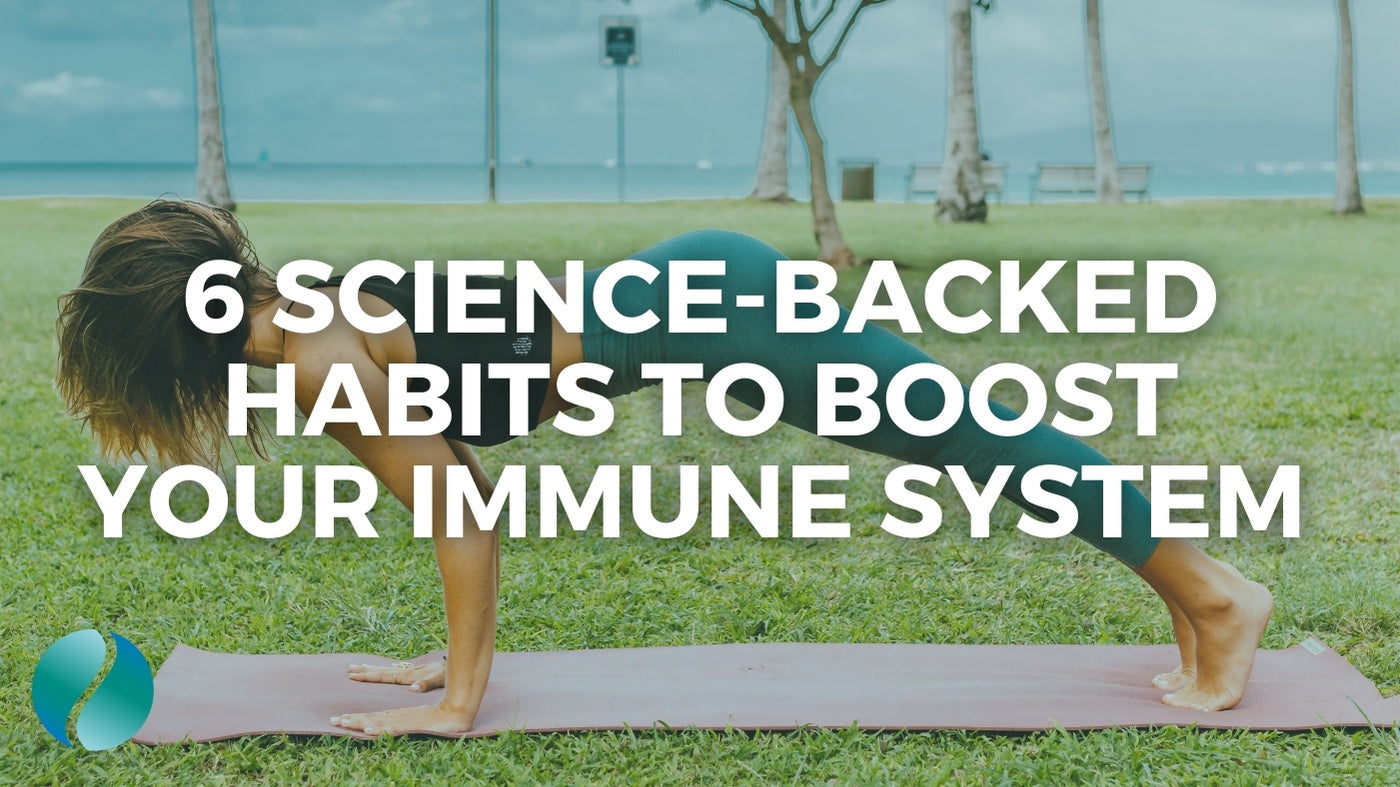Your immune system is your body’s frontline defense, working tirelessly to protect you from illness and keep you at your best. Supporting your immune health doesn’t have to be overwhelming—simple, science-backed habits can make a significant difference. Let’s explore effective ways to boost your immunity that are easy to incorporate into daily life.
The Power of Consistency
The immune system thrives on balance and regular care. Simple, consistent actions can lead to meaningful improvements in your health and resilience.
1. Prioritize Quality Sleep

Did you know that consistently getting less than seven hours of sleep per night triples your risk of catching a common cold? Sleep isn’t just a luxury—it’s your body’s most powerful immune-boosting tool. During deep rest, your immune system repairs, regenerates, and fortifies itself against illness. By prioritizing quality sleep, you’re giving your body the foundation it needs to stay strong and resilient.

Prioritizing sleep doesn’t have to be complicated—small, intentional changes to your routine can make a big difference in your overall rest and well-being. Here are a few simple yet effective strategies to help you sleep better and support your immune health:
- Create a consistent sleep schedule, going to bed and waking up at the same time every day.
- Limit exposure to screens before bed, and engage in calming activities like reading or meditating.
- Keep your bedroom cool, dark, and quiet for optimal rest.
Tools like weighted blankets and sleep masks can play a valuable role in improving sleep quality. Weighted blankets provide gentle, evenly distributed pressure that creates a soothing, cocoon-like sensation, helping to boost serotonin and melatonin levels while lowering cortisol, the stress hormone. Similarly, weighted sleep masks not only block out light but also apply gentle pressure to key points on the face, encouraging relaxation and supporting a deeper, more restorative sleep experience.
2. Move Your Body Regularly

Physical activity has a profound effect on your immune health. Moderate exercise helps improve circulation, reduces stress, and supports the efficient movement of immune cells throughout your body.[2] When you exercise outdoors, you amplify these benefits by tapping into the healing power of nature and sunlight.[3]
Benefits of exercising outside:
- Exposure to nature and sunlight has been shown to enhance immune function and reduce inflammation, giving your body an extra layer of defense.
- Fresh air and natural surroundings reduces stress and promote mental clarity, enhancing the overall benefits of your workout.
- Outdoor activities like hiking, jogging, or cycling can feel more engaging and enjoyable, helping you stick to your fitness routine.

Exercise tips:
- Aim for 150 minutes of moderate exercise per week, and incorporate outdoor activities whenever possible.
- Choose enjoyable options like brisk walking in the park, yoga on the grass, or swimming in natural waters.
- Listen to your body -- while regular movement is beneficial, over-exercising can temporarily suppress your immune response.
3. Use a Sauna for Recovery and Resilience
Imagine a single activity that can help your body detoxify, improve circulation, and strengthen its defenses against stress and illness—all while you simply sit and relax. Saunas, especially infrared saunas, offer this unique trifecta of benefits, making them a powerful ally in boosting your immune health.[4]

Benefits of infrared saunas:
- They penetrate deeper into your skin, promoting gentle detoxification process.
- They improve blood flow, helping immune cells travel more efficiently.
- They create a relaxing environment, reducing stress levels and enhancing recovery.[5]
Incorporating a sauna session into your weekly routine can be a relaxing way to boost your immune system and support overall wellness.
4. Stress Less to Stay Resilient

Did you know that chronic stress can weaken your immune system, leaving you more vulnerable to illness?[6] Stress isn’t just a mental hurdle—it’s a physical challenge your body must overcome to stay resilient. By managing stress effectively, you’re protecting your immune health and boosting your overall well-being.
Simple stress-relief practices:
- Practice mindfulness or meditation for a few minutes daily.
- Spend time in nature or connect with loved ones for emotional support.
- Engage in creative activities, like painting or journaling, to unwind.
5. Stay Hydrated

Water is essential for maintaining a strong immune system. Proper hydration supports the circulation of nutrients, removes toxins, and ensures your body functions at its best. By staying consistently hydrated, you give your immune system the tools it needs to operate efficiently.[7]
Daily hydration tips:
- Start your day with a large glass of water to kickstart your metabolism and hydration levels.
- Add fresh lemon juice for a vitamin C boost. Lemon water also perks up your energy levels and kick-starts your metabolism.
- Keep a reusable water bottle nearby to track your intake throughout the day. Be sure to stay away from plastic water bottles.
- Add cucumber and mint for natural flavors and a refreshing taste.
Staying hydrated with clean, high-quality water is essential for overall health. Using a filtered water pitcher can help by removing impurities such as chlorine and heavy metals, providing water that supports your well-being without introducing unnecessary toxins. For an additional step, hydrogen water offers potential benefits, as it is infused with molecular hydrogen through a specialized bottle that uses electrolysis. This type of water may help reduce inflammation, combat oxidative stress, and support cellular health, contributing to a stronger immune system.

6. Fuel Your Body with Whole, Immune-Supporting Foods

Your diet is one of the most impactful tools for enhancing your immune system. Nutrient-rich foods provide the vitamins and minerals your body needs to fight off illness and recover quickly.[8]
Immune-Supporting Foods:
- Fruits and vegetables: Packed with antioxidants to reduce inflammation.
- Healthy fats: Found in avocados, nuts, and olive oil, supporting immune cell function.
- Fermented foods: Probiotics in yogurt or sauerkraut promote gut health, closely linked to immunity.
- Lean proteins: Essential for producing immune cells and antibodies.
Empower Your Immune System Today
Boosting your immune health is simpler than you think. Focus on restorative sleep, regular movement, stress management, hydration, sauna therapy, and nutrient-rich eating to create a lifestyle that promotes lasting wellness.
Start small—choose one habit to focus on this week. Consistent actions lead to transformative results over time. Your immune system—and future self—will thank you.
Resources:
[1] Cohen, Sheldon et al. “Sleep habits and susceptibility to the common cold.” Archives of internal medicine vol. 169,1 (2009): 62-7. doi:10.1001/archinternmed.2008.505
[2] Nieman, David C, and Laurel M Wentz. “The compelling link between physical activity and the body's defense system.” Journal of sport and health science vol. 8,3 (2019): 201-217. doi:10.1016/j.jshs.2018.09.009
[3] Twohig-Bennett, Caoimhe, and Andy Jones. “The health benefits of the great outdoors: A systematic review and meta-analysis of greenspace exposure and health outcomes.” Environmental research vol. 166 (2018): 628-637. doi:10.1016/j.envres.2018.06.030
[4] Pilch, Wanda et al. “Effect of a single finnish sauna session on white blood cell profile and cortisol levels in athletes and non-athletes.” Journal of human kinetics vol. 39 127-35. 31 Dec. 2013, doi:10.2478/hukin-2013-0075
[5] Bontemps, Bastien, et al. "Utilisation of Far Infrared-emitting Garments for Optimising Performance and Recovery in Sport: Real Potential or New Fad? A Systematic Review." PLOS ONE, vol. 16, no. 5, 2021, p. e0251282, https://doi.org/10.1371/journal.pone.0251282. Accessed 3 Jan. 2025.
[6] Dhabhar, Firdaus S. “Effects of stress on immune function: the good, the bad, and the beautiful.” Immunologic research vol. 58,2-3 (2014): 193-210. doi:10.1007/s12026-014-8517-0
[7] Popkin, Barry M et al. “Water, hydration, and health.” Nutrition reviews vol. 68,8 (2010): 439-58. doi:10.1111/j.1753-4887.2010.00304.x
[8] Munteanu, Camelia, and Betty Schwartz. “The relationship between nutrition and the immune system.” Frontiers in nutrition vol. 9 1082500. 8 Dec. 2022, doi:10.3389/fnut.2022.1082500





